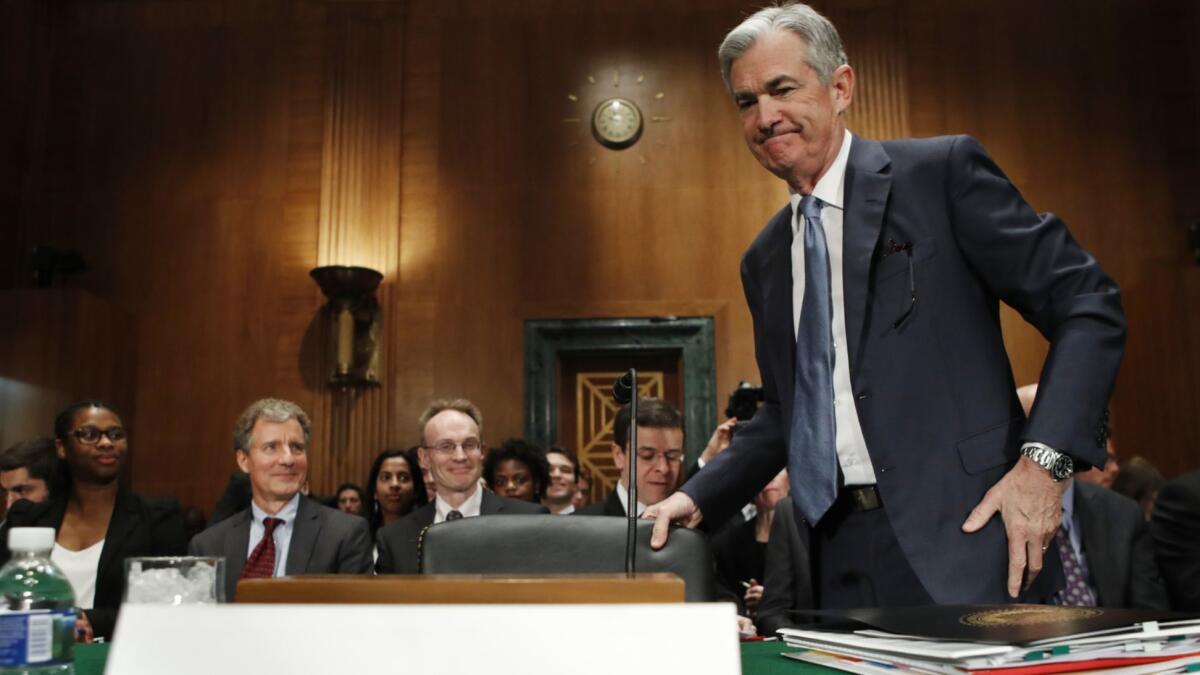Op-Ed: If Trump wants to get reelected, he should rethink his Federal Reserve picks

Many of us would rather not think about the possibility of President Trump getting reelected, but there is little doubt that he is thinking about it.
If Trump is serious about winning reelection, he may want to reconsider the sort of people he is appointing to the Federal Reserve. Virtually all political experts agree that a central factor in a presidentâs reelection prospects is the state of the economy in the year he or she is running. But Trump is appointing people who are likely to support rapid increases in interest rates, which very well could slow economic growth.
Unfortunately, most Americans donât pay much attention to the Fed. People usually perceive its decisions about interest rates and inflation as affecting only Wall Street and big investor types. But the Fed has an enormous impact on the lives of ordinary workers. When it chooses to raise interest rates, as it has been doing for the last 15 months, it is making a conscious decision to slow the economy.
Higher interest rates discourage people from buying new cars and homes. Fewer home owners refinance mortgages. Businesses and state and local governments are less likely to borrow to invest in new factories, equipment and infrastructure. When growth slows, the economy has fewer jobs. The unemployment rate could stop falling and even rise. People with jobs also are worse off because they have less bargaining power in a weaker labor market. Their wages rise less rapidly and may not keep up with inflation.
The Fed and its leadership should matter to all of us, in other words.
Until the beginning of February, the central bank was led by Janet L. Yellen. Over the previous 15 months, Yellen, an Obama appointee, went along with four interest rate hikes, but she was much more cautious about rate increases than many other economists.
Just a few years ago, it was widely believed by economists that the unemployment rate could not get below 5% without triggering an inflationary spiral. The Congressional Budget Office even projected that unemployment could not fall below 5.4% without sparking inflation.
Trump is appointing people who are likely to support rapid increases in interest rates, which very well could slow economic growth.
Yellen persuaded her colleagues to ignore such projections, and to allow the unemployment rate to continue to fall. Her strategy of delaying interest rate hikes, and then raising rates only gradually, enabled millions of workers to get jobs and tens of millions of workers to see wage gains. For the first time since the late 1990s, workers at the middle and bottom of the pay ladder are seeing wage gains that exceed inflation.
Trump decided against offering Yellen a second term and replaced her with Jerome Powell, a Republican who sat on the Fedâs board. Though Powell voted with Yellen in the past, he has picked two advisors from the raise-rates-faster crowd, Jon Faust and Antulio Bomfim.
Trumpâs other picks also are likely to support more rapid rate hikes. Randal Quarles, who was approved as the Fedâs vice chairman for supervision in October, has repeatedly warned that low interest rates increase the risk of dangerous asset bubbles. Rather than looking to regulatory solutions to deal with the threat of bubbles, Quarles urges higher interest rates. Marvin Goodfriend, nominated by Trump to be a governor at the Fed but not yet approved by the Senate, has been advocating for higher interest rates since 2011.
The only current governor who can be counted on to show restraint when it comes to interest rate hikes and back full employment is Lael Brainard, the sole holdover from the Obama years. Some of the Fedâs 12 district bank presidents, most notably Neel Kashkari at the Minneapolis Fed and Charles Evans at the Chicago Fed, also have supported full employment. But this trio is not likely to prevail if the rest of the Fed wants to raise interest rates.
The U.S. economy has been expanding for nine years. If this growth continues into 2020, we will be in the eleventh year of a recovery, or the longest in American history. There is no reason the economy should not go that long without a recession â Australia hasnât had one in more than a quarter-century â but it will require good management at the Fed and leaders who are committed to maintaining full employment.
If the Senate approves Goodfriend, there will be three more slots to fill on the Fedâs board of governors. Trump should avoid the usual Republican suspects and pick economists who are inclined to vote against rate increases. He can do this in the name of improving his reelection prospects. The rest of us will be happy to see workers get jobs and decent wages.
Dean Baker is a co-director of the Center for Economic and Policy Research and the author of âRigged: How Globalization and the Rules of the Modern Economy Were Structured to Make the Rich Richer.â
Follow the Opinion section on Twitter @latimesopinion or Facebook
More to Read
A cure for the common opinion
Get thought-provoking perspectives with our weekly newsletter.
You may occasionally receive promotional content from the Los Angeles Times.










